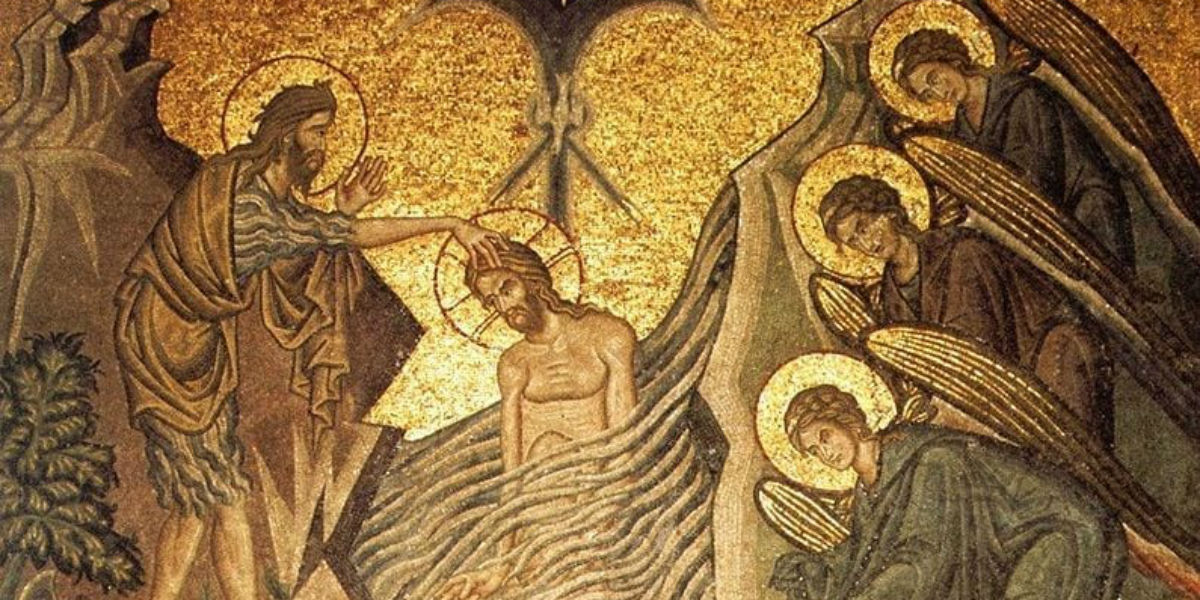Pope Leo XIV – Inaugural Mass Homily
Elected on May 8, 2025, as the 267th successor of St. Peter, Pope Leo XIV’...

This post is also available in: Spanish, Italian
The Feast of the Baptism of the Lord Jesus Christ in the Jordan closes the Christmas Season. This reflection on the scripture readings for the feast also provide us insight into the sacraments of baptism and Confirmation and give us food for meditation as we say the first luminous mystery of the rosary.
To LISTEN to this post read by Dr. Italy, click on the play arrow on the left, directly below this paragraph.
At first glance, the scene makes little sense. John’s strident call to repentance provokes an overwhelming response. People of all shapes and sizes flock to him in the wilderness. They are baptized in the Jordan as a sign of repentance and cleansing.
Suddenly, out of the crowd steps John’s cousin Jesus.
Wait a minute. What’s Jesus, the sinless one, doing in a crowd of repenting sinners? What’s he doing coming forward to be baptized by John, who is by John’s own admission, inferior to his cousin?
Jesus does not enter the water to be sanctified. No, the Holy One enters the water to sanctify. He makes this humble, ordinary element extraordinary, empowering it to become a channel of the Holy Spirit bringing inner cleansing, rebirth, and transformation to those who will be bathed in it. Here Jesus institutes the sacrament of Christian baptism, something essentially different and greater than the baptism of John, which foreshadowed it.
Immediately after coming out of the water, the Spirit descends upon him in the form of a dove. Now another sacrament is instituted by Christ, the sacrament of confirmation or, as the Eastern churches call it, chrismation.
Notice that as the Spirit descends upon Jesus, the Father announces from heaven that this is His beloved Son. Here we have a majestic revelation of the Most Holy Trinity, one God in three persons. Then notice that Peter, speaking of this event in Acts 10:37, calls it Jesus’ “anointing.”
In the Old Testament, people were anointed with a special type of perfumed olive oil called “chrism” which was stored in a bull’s horn, a symbol of strength. The first people to be so anointed in the Old Testament were priests, authorized to offer sacrifice on behalf of the people. Then came prophets, anointed to proclaim God’s challenging, energizing word. Finally kings were anointed by God to save their people from their enemies. Actually, the reigning king of Judah was called “the anointed one,” “messiah” in Hebrew or in Greek, “Christ.”
So this feast is Jesus’ “name day.” Of course he is the Word made flesh, full of the Spirit, and savior of Israel from the moment of conception. But on this day, the Spirit anoints his human nature in a new way, empowering and equipping him for battle, for his mission to smash the oppressing powers of sin, Satan, and death, and to lead his people into freedom. He is anointed or “christened” not just as savior-king, but as perfect prophet who speaks God’s final word, and perfect priest who offers the perfect sacrifice taking away all sin.
Some wonder why we need the sacrament of confirmation. To some it appears to be an afterthought, as anticlimactic. After all, we receive the Spirit in baptism and receive Christ bodily in the Eucharist. So what else do we get when we are confirmed?
Simple. We receive our mission and the power to carry it out. For being a “Christian” is not about just “getting saved.” It’s about sharing in Christ’s anointing to transform the world. The mission is an essential part of the package, not an option. That’s why we are called “Christians” or anointed ones. It is not just priests and religious who are supposed to make it happen. Every single one of us is called and anointed. And that’s why confirmation is one of the essential sacraments of initiation. Without it, one is not fully incorporated into the Church, which is a missionary community.
The question for those of us who have received this power-packed sacrament is this–what are we doing with it?
For more great resources on the Baptism of the Lord, visit the Epiphany – Baptism of Christ section of the Crossroads Initiative Library.
This post is offered as a commentary on the scripture readings for the Feast of the Baptism of the Lord Jesus Christ, cycles A, B, and C (Isaiah 42:1-7 or Is. 55:1-11; Psalm 29, Acts 10:34-38 or I John 5:1-9; Mark 1:7-11 or Matthew 3:13-17).
Banner/featured image of the Baptism of the Lord Jesus Christ in the Cathedral of San Marco by an unknown mosaic artist. Public domain.
J Magangi
Posted at 17:18h, 30 JanuaryI love this message, as a pastor i have been asked this question several, I have received satifactory answer. I dont know how can i be your disciple?, being in kenya mighty be seen far.